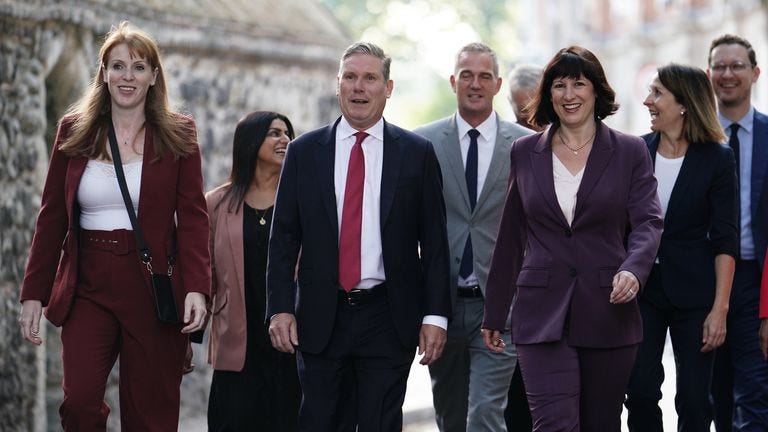Keir Starmer's Rightward Shift
By embracing neoliberalism, Labour rehabilitates the last 13 years of Tory rule and keeps the Overton Window stuck on the right.
During the 2020 Labour Party leadership election, Keir Starmer presented himself as a mediator, someone who could mend the party’s many rifts and act as an adhesive between their numerous factions. On the campaign trail, he regularly spoke about moderating the party’s image while keeping the passion and energy injected by Corbyn’s tenure. This message of reconciliation resonated with the base, delivering him a landslide victory, where he won more than 50% of the vote, offsetting a dreaded second round.
Fast forward three years and the word ‘reconciliation’ is nowhere to be seen. Instead, factionalism runs rampant. Since becoming leader, Starmer has waged an aggressive war against the party’s Left, purging socialist groups, deselecting left-wing candidates, and surrounding himself with Blairite, managerial consultants. Mildly progressive policies such as a wealth tax and abolishing the House of Lords have either been diluted or abandoned entirely, sidelined in favour of pro-business policies as the party tries to appeal to the corporate world.
And the leadership has been clear about what it’s been up to, briefing the press that it’s pursuing what it calls the “heir and the spare” strategy, whereby left-wingers are blocked, a Starmer-backed candidate goes through, and their only competition is someone else the leadership also favours. In some cases, none of the candidates on the shortlist are local. And where leadership doesn’t get the shortlist it wants, it simply dissolves the local selection committee, as in Kensington & Camberwell Peckham.
From Bella Sankey in Hastings to Jack Hemingway in Wakefield, even soft-left figures are being denied a chance to make their case in front of members. And there are more damaging effects still. As Michael Crick reports, very few candidates so far selected are working class; instead, they are mostly from the professional political classes, with many also working in the third sector.
Starmer’s most rabid acolytes defend this rightward veer by pointing to the insurmountable lead the party now has in the polls, with a median lead of around 20 points. To them, securing power is seen as paramount, and ideological purity is nothing but a distraction. Only in government can Labour deliver transformative change, so goes the refrain.
There’s only one issue with this claim. Once power has been consolidated – with some polls predicting Labour is on the verge of replicating Blair’s enormous majority – what will incentivize Starmer and the right-wing hierarchy he’s built around himself to embrace progressive goals?
In the face of declining membership numbers and the fees they bring with them, Labour has plugged the revenue deficit by attracting large businesses and wealthy benefactors, two groups whose views drastically diverge from the communities Labour espouses to represent, the working-class and the poor. Starmer now listens to Lord Sainsbury and Mohamed Amersi for advice, not the tens of thousands of working-class activists that built the party. And the recent cabinet shuffle demonstrates Labour is not shifting gears anytime soon. Soft-left members like Nandy and Rayner have been demoted while austerity fetishists like Reeves and Mcfadden have been strengthened.
While winning power is important for any political party, they also need to make an argument for why their vision works for the country. Political space is limited and only through passionate defence can policies regarded as radical become mainstream. In 1945, when Labour won its first official majority, the very thought of universal healthcare was seen by many as unachievable, especially since the right-wing press carried out an attack campaign against it. However, by standing their ground and passionately advocating for the policy, Labour’s frontbench was able to make that dream a reality, delivering one of the most renowned healthcare services in the world and Labour’s biggest legislative achievement.
Pushback from right-wing opposition groups is inevitable, how left-wing parties adequately defuse these claims is a perfect litmus test as to whether they are genuinely committed to delivering the substantial, transformative changes this country desperately needs. If Starmer spends years rehabilitating conservative rhetoric on crime, taxes and welfare, it will be very difficult, if not outright impossible, for him to pull away from it and implement left-wing policies.
Starmer and the rest of the Labour leadership seem to have taken the view that the main problem with the Tories is their managerial incompetence, not their ideology. It’s a redundant belief that relies heavily on the perception that selling voters on a party’s ineptitude is easier than highlighting and challenging the deep structural cracks that have brought the country to a standstill.
The goal now is what it was back in the New Labour era: to dramatically narrow what’s politically acceptable in Labour to tepid centrism and to stuff Parliament with a new generation of nodding dogs, loyal only to their career progression and the people that put them there — not local members but a London-based elite at the top of the Party. It’s exactly what Blair did and why so many people across the country have no trust in politicians now.
Stagnant growth, low wages, and declining services are all byproducts of an austerity regime the Tories have heaped on the country. After 13 years of this, small, gradual changes will not suffice. Broader, more extensive reforms are needed to reverse this decay. Without upending this neoliberal orthodoxy, Labour cannot claim to be fixing the Conservatives’ mess. Instead, they appear more as caretakers, warming the seat of government for a term before the Tories re-take their place as the natural party of governing.



